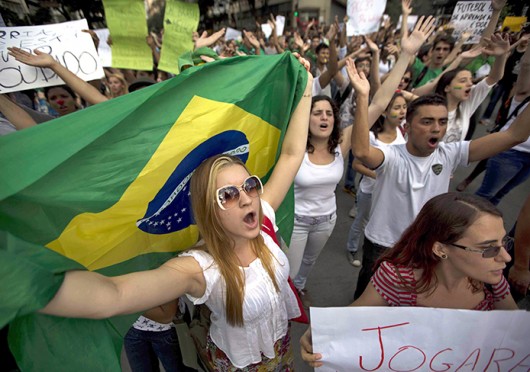
Demonstrators participate in a protest against the rising public transportation prices, and the Brazilian government’s lavish spending for the FIFA Confederations Cup and World Cup soccer events June 19 in Belo Horizonte, Minas Gerais, Brazil.
Courtesy of MCT
While most of the world is invested in the Winter Olympics, there are those of us that are counting down the days until June 12.
That day marks the beginning of the greatest single event in sports: the World Cup.
Brazil is hosting this year’s tournament, and the excitement has been building for four years since Spain claimed its first World Cup title in 2010.
The questions from pundits are wide-ranging, to say the least. Can the Spaniards repeat? Will Brazil claim its record sixth title, this time on home soil? Will it be Argentina’s Lionel Messi or Portugal’s Cristiano Ronaldo who will solidify their claim at being the world’s best player by leading their team to glory on the sport’s biggest stage?
When one pictures a Brazilian World Cup, images of Pelé, Garrincha, Zico and Ronaldinho come to mind. A truly beautiful version of the beautiful game.
But while happiness and excitement run rampant, if you peel back the layers, you will find a much darker scene.
As the clock ticks down until Brazil take on Croatia in Sao Paulo June 12, there are still issues in Brazil.
Five of the 12 host sites for matches at the World Cup were intended to be finished by the end of 2013 but were still under construction as of last Saturday according to a report by The Guardian.
The worst of these was the Arena da Baixada in Curitiba, which until Tuesday was under threat of losing its right to host to another city if it did not pass a FIFA inspection.
Although the city passed, the idea that this puts on display is a scary one: if Brazil can’t have these stadiums ready by its initial deadline, what faith can we have that it will be ready for the actual tournament?
According to the same report by The Guardian, there have also been six worker deaths in the construction and renovation of these stadiums.
Protests have also been a big problem in the lead up to the World Cup.
Periodically throughout the summer of 2013 and stretching into this year, the youth of Brazil have poured into the streets to protest the money that’s being poured into the World Cup despite a failing economy, which pales in comparison to the violent deaths directly related to Brazilian football that have occurred in the past year.
The situation right now seems like a powder keg, and that one little spark could cause the whole thing to blow.
Will the tournament go on, even with the chaos in the streets and the questionable safety of the stadiums? Yes. But the likelihood that it will go off without a hitch decreases by the day.
For an event so romanticized by soccer faithful — myself included — this is a frightening precedent that is being set. If a country thought to be so ingrained in soccer, particularly on the national level, is struggling like this, what will it be like for those less culturally impassioned by the sport (Qatar 2022 comes to mind).
Will I still tune in to every match I can, voraciously cheering on the U.S. Men’s National Team as they attempt to escape their so-called Group of Death and advance? Of course I will.
But some part of me will be on the edge of my seat for a different reason. I will be waiting and wondering if and when the next negative thing will happen, and what could happen to the legacy of the greatest sporting event in the world.


